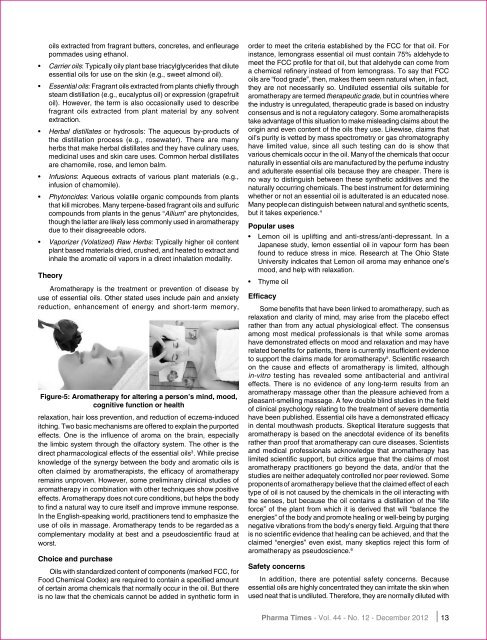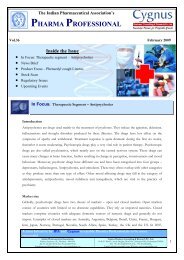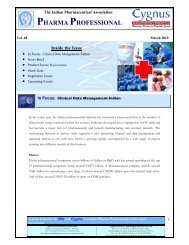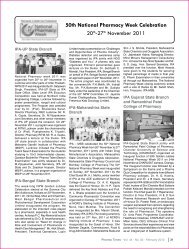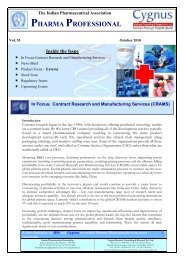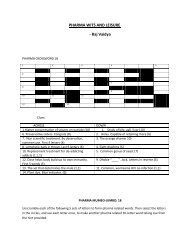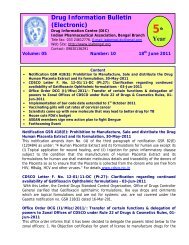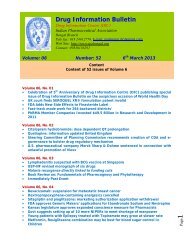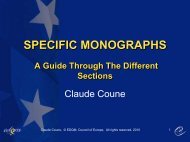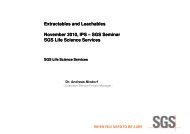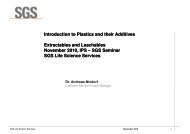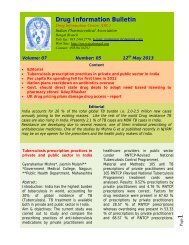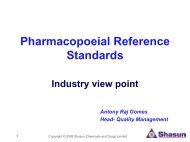Aromatherapy: The Doctor of Natural Harmony of Body & Mind
Aromatherapy: The Doctor of Natural Harmony of Body & Mind
Aromatherapy: The Doctor of Natural Harmony of Body & Mind
You also want an ePaper? Increase the reach of your titles
YUMPU automatically turns print PDFs into web optimized ePapers that Google loves.
oils extracted from fragrant butters, concretes, and enfleurage<br />
pommades using ethanol.<br />
• Carrier oils: Typically oily plant base triacylglycerides that dilute<br />
essential oils for use on the skin (e.g., sweet almond oil).<br />
• Essential oils: Fragrant oils extracted from plants chiefly through<br />
steam distillation (e.g., eucalyptus oil) or expression (grapefruit<br />
oil). However, the term is also occasionally used to describe<br />
fragrant oils extracted from plant material by any solvent<br />
extraction.<br />
• Herbal distillates or hydrosols: <strong>The</strong> aqueous by-products <strong>of</strong><br />
the distillation process (e.g., rosewater). <strong>The</strong>re are many<br />
herbs that make herbal distillates and they have culinary uses,<br />
medicinal uses and skin care uses. Common herbal distillates<br />
are chamomile, rose, and lemon balm.<br />
• Infusions: Aqueous extracts <strong>of</strong> various plant materials (e.g.,<br />
infusion <strong>of</strong> chamomile).<br />
• Phytoncides: Various volatile organic compounds from plants<br />
that kill microbes. Many terpene-based fragrant oils and sulfuric<br />
compounds from plants in the genus “Allium” are phytoncides,<br />
though the latter are likely less commonly used in aromatherapy<br />
due to their disagreeable odors.<br />
• Vaporizer (Volatized) Raw Herbs: Typically higher oil content<br />
plant based materials dried, crushed, and heated to extract and<br />
inhale the aromatic oil vapors in a direct inhalation modality.<br />
<strong>The</strong>ory<br />
<strong>Aromatherapy</strong> is the treatment or prevention <strong>of</strong> disease by<br />
use <strong>of</strong> essential oils. Other stated uses include pain and anxiety<br />
reduction, enhancement <strong>of</strong> energy and short-term memory,<br />
Figure-5: <strong>Aromatherapy</strong> for altering a person’s mind, mood,<br />
cognitive function or health<br />
relaxation, hair loss prevention, and reduction <strong>of</strong> eczema-induced<br />
itching. Two basic mechanisms are <strong>of</strong>fered to explain the purported<br />
effects. One is the influence <strong>of</strong> aroma on the brain, especially<br />
the limbic system through the olfactory system. <strong>The</strong> other is the<br />
direct pharmacological effects <strong>of</strong> the essential oils 3 . While precise<br />
knowledge <strong>of</strong> the synergy between the body and aromatic oils is<br />
<strong>of</strong>ten claimed by aromatherapists, the efficacy <strong>of</strong> aromatherapy<br />
remains unproven. However, some preliminary clinical studies <strong>of</strong><br />
aromatherapy in combination with other techniques show positive<br />
effects. <strong>Aromatherapy</strong> does not cure conditions, but helps the body<br />
to find a natural way to cure itself and improve immune response.<br />
In the English-speaking world, practitioners tend to emphasize the<br />
use <strong>of</strong> oils in massage. <strong>Aromatherapy</strong> tends to be regarded as a<br />
complementary modality at best and a pseudoscientific fraud at<br />
worst.<br />
Choice and purchase<br />
Oils with standardized content <strong>of</strong> components (marked FCC, for<br />
Food Chemical Codex) are required to contain a specified amount<br />
<strong>of</strong> certain aroma chemicals that normally occur in the oil. But there<br />
is no law that the chemicals cannot be added in synthetic form in<br />
order to meet the criteria established by the FCC for that oil. For<br />
instance, lemongrass essential oil must contain 75% aldehyde to<br />
meet the FCC pr<strong>of</strong>ile for that oil, but that aldehyde can come from<br />
a chemical refinery instead <strong>of</strong> from lemongrass. To say that FCC<br />
oils are “food grade”, then, makes them seem natural when, in fact,<br />
they are not necessarily so. Undiluted essential oils suitable for<br />
aromatherapy are termed therapeutic grade, but in countries where<br />
the industry is unregulated, therapeutic grade is based on industry<br />
consensus and is not a regulatory category. Some aromatherapists<br />
take advantage <strong>of</strong> this situation to make misleading claims about the<br />
origin and even content <strong>of</strong> the oils they use. Likewise, claims that<br />
oil’s purity is vetted by mass spectrometry or gas chromatography<br />
have limited value, since all such testing can do is show that<br />
various chemicals occur in the oil. Many <strong>of</strong> the chemicals that occur<br />
naturally in essential oils are manufactured by the perfume industry<br />
and adulterate essential oils because they are cheaper. <strong>The</strong>re is<br />
no way to distinguish between these synthetic additives and the<br />
naturally occurring chemicals. <strong>The</strong> best instrument for determining<br />
whether or not an essential oil is adulterated is an educated nose.<br />
Many people can distinguish between natural and synthetic scents,<br />
but it takes experience. 4<br />
Popular uses<br />
• Lemon oil is uplifting and anti-stress/anti-depressant. In a<br />
Japanese study, lemon essential oil in vapour form has been<br />
found to reduce stress in mice. Research at <strong>The</strong> Ohio State<br />
University indicates that Lemon oil aroma may enhance one’s<br />
mood, and help with relaxation.<br />
• Thyme oil<br />
Efficacy<br />
Some benefits that have been linked to aromatherapy, such as<br />
relaxation and clarity <strong>of</strong> mind, may arise from the placebo effect<br />
rather than from any actual physiological effect. <strong>The</strong> consensus<br />
among most medical pr<strong>of</strong>essionals is that while some aromas<br />
have demonstrated effects on mood and relaxation and may have<br />
related benefits for patients, there is currently insufficient evidence<br />
to support the claims made for aromatherapy 5 . Scientific research<br />
on the cause and effects <strong>of</strong> aromatherapy is limited, although<br />
in-vitro testing has revealed some antibacterial and antiviral<br />
effects. <strong>The</strong>re is no evidence <strong>of</strong> any long-term results from an<br />
aromatherapy massage other than the pleasure achieved from a<br />
pleasant-smelling massage. A few double blind studies in the field<br />
<strong>of</strong> clinical psychology relating to the treatment <strong>of</strong> severe dementia<br />
have been published. Essential oils have a demonstrated efficacy<br />
in dental mouthwash products. Skeptical literature suggests that<br />
aromatherapy is based on the anecdotal evidence <strong>of</strong> its benefits<br />
rather than pro<strong>of</strong> that aromatherapy can cure diseases. Scientists<br />
and medical pr<strong>of</strong>essionals acknowledge that aromatherapy has<br />
limited scientific support, but critics argue that the claims <strong>of</strong> most<br />
aromatherapy practitioners go beyond the data, and/or that the<br />
studies are neither adequately controlled nor peer reviewed. Some<br />
proponents <strong>of</strong> aromatherapy believe that the claimed effect <strong>of</strong> each<br />
type <strong>of</strong> oil is not caused by the chemicals in the oil interacting with<br />
the senses, but because the oil contains a distillation <strong>of</strong> the “life<br />
force” <strong>of</strong> the plant from which it is derived that will “balance the<br />
energies” <strong>of</strong> the body and promote healing or well-being by purging<br />
negative vibrations from the body’s energy field. Arguing that there<br />
is no scientific evidence that healing can be achieved, and that the<br />
claimed “energies” even exist, many skeptics reject this form <strong>of</strong><br />
aromatherapy as pseudoscience. 6<br />
Safety concerns<br />
In addition, there are potential safety concerns. Because<br />
essential oils are highly concentrated they can irritate the skin when<br />
used neat that is undiluted. <strong>The</strong>refore, they are normally diluted with<br />
Pharma Times - Vol. 44 - No. 12 - December 2012 13


